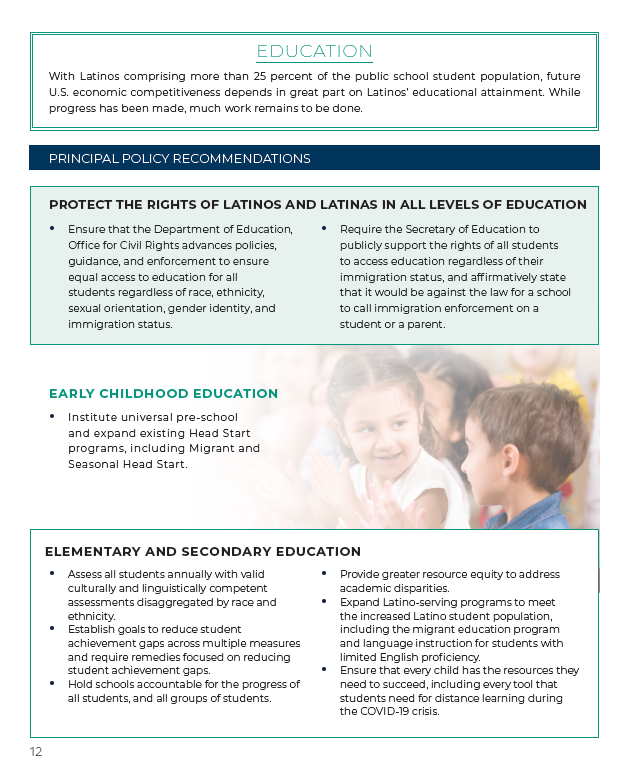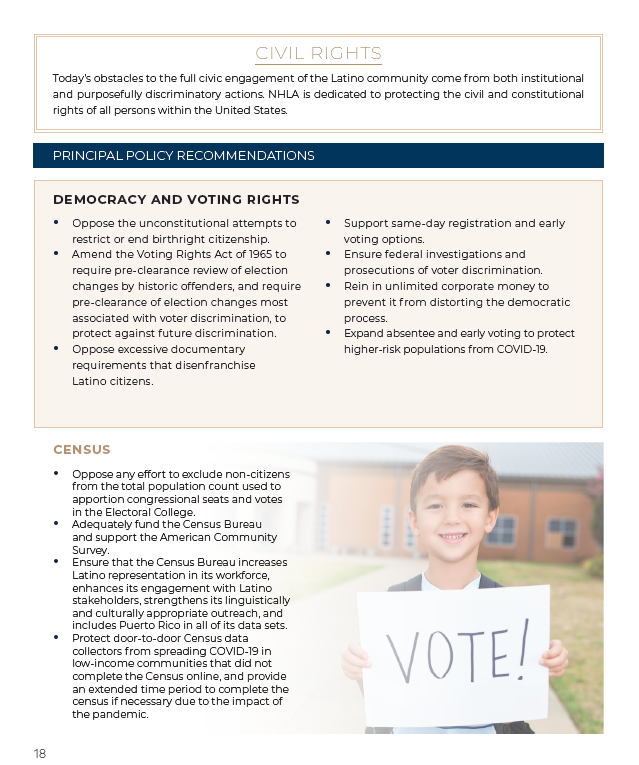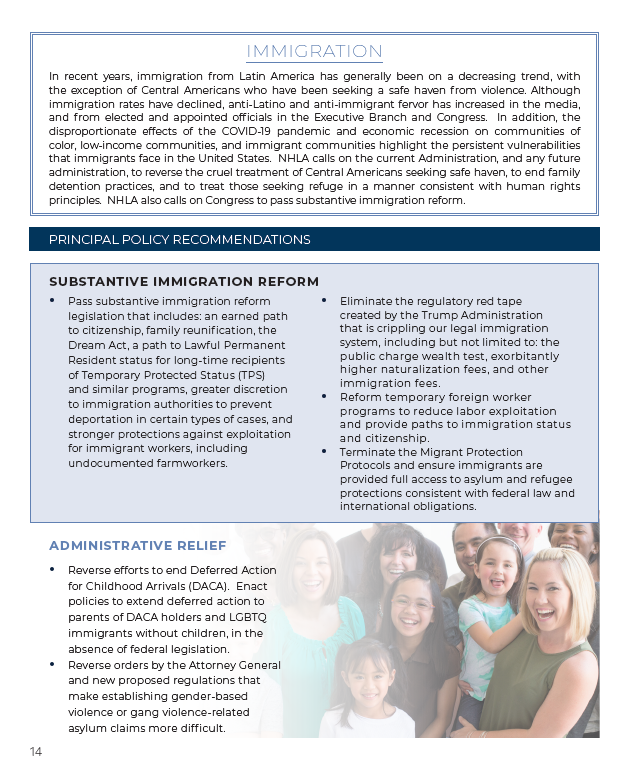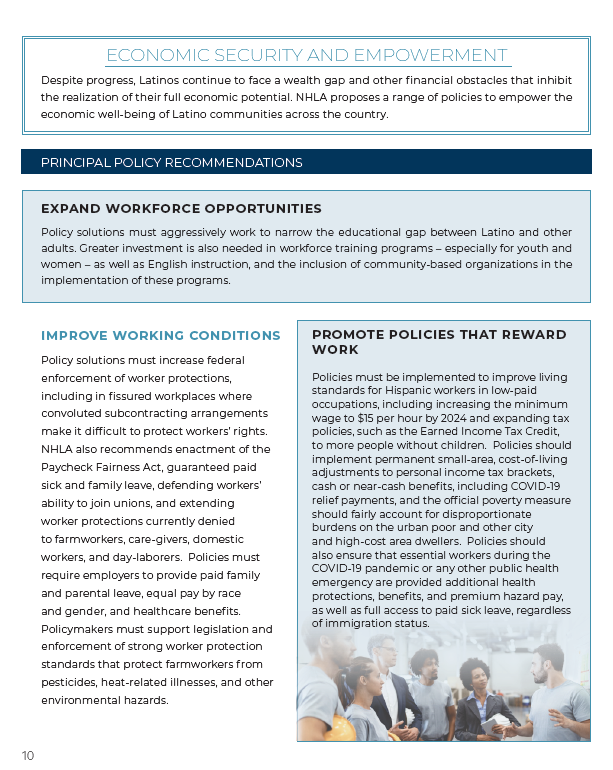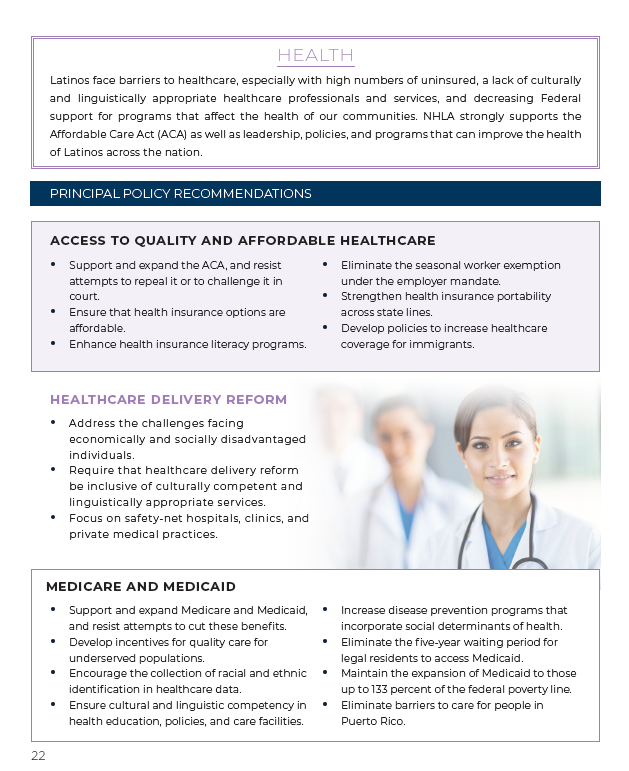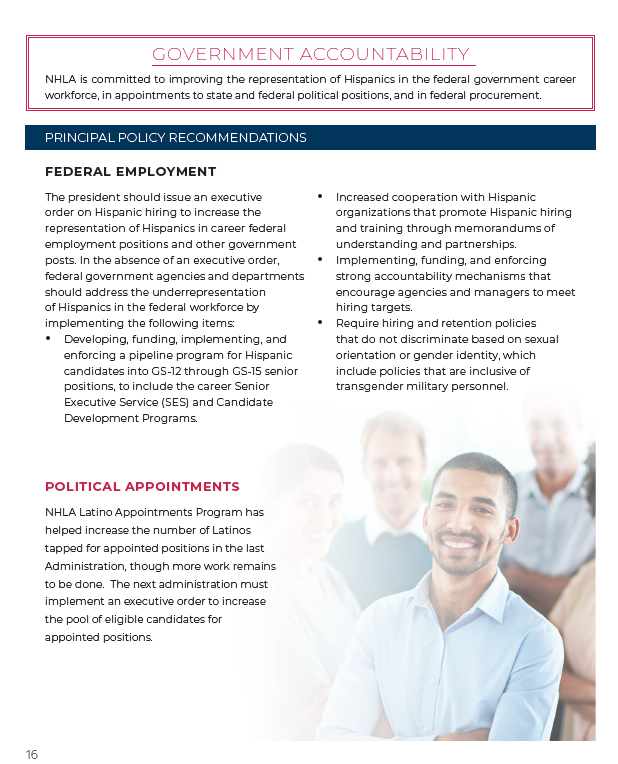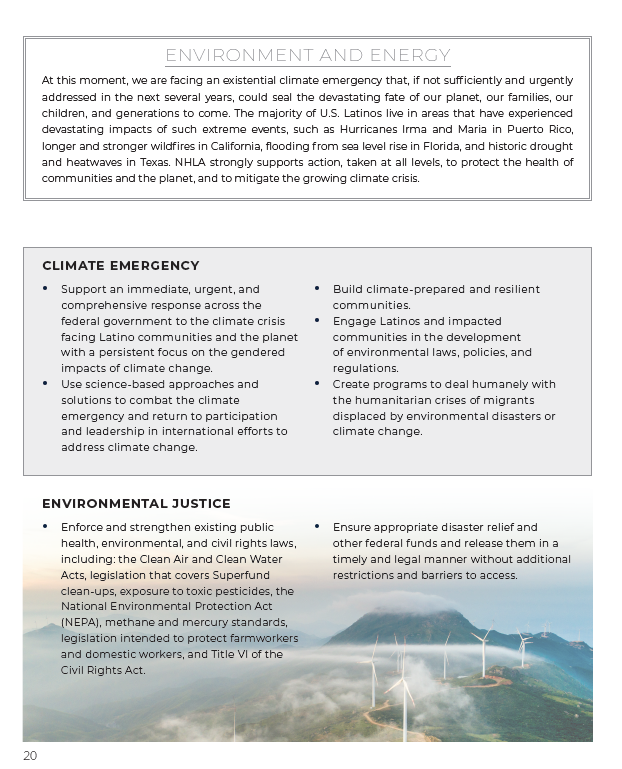PRESS RELEASE
FOR IMMEDIATE DISTRIBUTION
August 28, 2015
LATINO LEADERS URGE PRESIDENTIAL CANDIDATES NOT TO SUPPORT CHANGING BIRTHRIGHT CITIZENSHIP
Redefining Citizenship Would Threaten The Civil Rights of Latinos
Washington, D.C. – The National Hispanic Leadership Agenda (NHLA), a coalition of 40 of the nation’s preeminent Latino advocacy organizations, sent a letter to each of the presidential candidates, urging them to oppose any policy that would end citizenship by birth. The letter, which was sent to both Democratic and Republican candidates, explains that the Fourteenth Amendment, as affirmed by Supreme Court rulings, guarantees United States citizenship for all who are born in this country.
The letter outlines the significant harms that eliminating citizenship by birth would cause, including the creation of an underclass of Latinos who would face even greater discrimination without the benefits of legal protection. The co-chairs of NHLA's Immigration Committee, who signed the letter, argue that these recently floated policy proposals are a dangerous threat to the civil rights of all Latinos.
"Ending citizenship by birth would be a disaster for our country and our community. Latinos already face unjust and discriminatory questioning of their immigration status. This policy change, endorsed by several presidential candidates, would exacerbate discrimination against Latinos, while creating an underclass of stateless children born without legal protections. Latinos have become the punching bag of this presidential campaign; the targets of senseless policy proposals and heartless hate speech. We urge the candidates not only to oppose ending citizenship by birth, but to treat our community and Latino voters with the respect we deserve," said Hector Sanchez, NHLA Chair and Executive Director of the Labor Council for Latin American Advancement.
“Citizenship by birth became the law of our nation following the great and bloody struggle of the Civil War, and the rule has served the United States extraordinarily well,” stated Thomas A. Saenz, NHLA Vice Chair and President and General Counsel of MALDEF. “Ramshackle proposals to change this established rule, tossed out in the course of political campaigns, disrespect history, national constitutional principle, and the sacrifices of the millions of immigrant descendants who have made this nation great.”
“Birthright citizenship is a bedrock principle of American law and culture,” stated José Calderón, President of the Hispanic Federation. "In fact, it is one of the features of our legal system that makes America truly exceptional. It is precisely that exceptionalism that the enemies of birthright citizenship seek to destroy. Instead of engaging in the necessary reform of our immigration system, they have opted for a shameful, nativist, and unconstitutional attack on immigrants and their families. The citizenship of millions of Americans isn't a matter of debate, isn't a campaign talking point, and, most importantly, isn't negotiable."
The complete letter is reproduced below.
Dear Candidate:
We write on behalf of the National Hispanic Leadership Agenda (NHLA), a coalition of 40 leading national Latino nonpartisan civil rights and advocacy organizations, to address the issue of birthright citizenship, which has recently again become a focus of debate nationally on immigration. Proposals to limit citizenship to certain individuals threaten the civil rights of Latinas and Latinos in the United States, restrict the ability of the Latino community to fully participate in this country’s legal and political system, and disrespect and diminish the historic struggles behind incorporation of citizenship by birth in our Constitution.
In recent weeks, several elected officials and electoral candidates have seemed to endorse proposals to end citizenship by birth. Efforts to restrict the right of citizenship under the Citizenship Clause of the Fourteenth Amendment are a significant and serious threat to the civil rights of Latinos in the United States. A policy that disrupts current interpretation and application of the Citizenship Clause would further restrict the ability of Latinos to fully enforce their constitutional and civil rights and create an underclass of stateless individuals, reminiscent of the pre-Civil War era.
The Fourteenth Amendment of the Constitution was ratified after the end of the Civil War, and Section 1, known as the “Citizenship Clause,” states that, “[a]ll persons born or naturalized in the United States and subject to the jurisdiction thereof, are citizens of the United States and of the State wherein they reside.” The Citizenship Clause is rooted in the aftermath of the Supreme Court’s divisive and retrograde decision in Scott v. Sandford, (infamously known as the Dredd Scott case). In Scott, citizenship was denied to freed African American former slaves on the premise that State citizenship rights were not transferable across state lines when a freed former slave traveled to or moved to another state. In adopting the Citizenship Clause of the Fourteenth Amendment, the nation guaranteed uniform U.S. citizenship, irrespective of race or ethnicity.
In 1898, the Supreme Court held in United States v. Wong Kim Ark, that under the Fourteenth Amendment citizens include “in clear words and in manifest intent . . . the children born within the territory of the United States of all other persons, of whatever race or color, domiciled within the United States.” Thus, the Citizenship Clause has long been interpreted to have only a narrow exclusion from citizenship by birth for those born to diplomatic personnel or to members of an occupying force during any foreign occupation.
Restricting the right to citizenship by birth to exclude certain individuals born to parents domiciled here would have a substantial detrimental impact on all Americans, and the impact would be particularly harmful to the Latino community. For instance, to implement such a policy at the administrative or local level would result in heavy administrative burdens for individuals and administrators in order to prove citizenship, creating widespread confusion for local registrars and officials. The result is likely to be a disparate impact on Latinos and Latinas, many of whom may be perceived to be undocumented, regardless of their actual status.
More importantly, a policy to end citizenship by birth would likely create an underclass of Latinos and Latinas who would be subject to discrimination or other adverse treatment based on ethnicity, national origin, or race, but without the protections of citizenship. The dangerous result would be a population of stateless individuals and a dramatic increase in the “undocumented” population by creating a caste of people unable to prove citizenship based on their birthplace. This is all at a time when the number of mixed-status families in this country continues to grow. Attacks on the Latino community by calling for an end to citizenship by birth undermine America’s fundamental principles of justice and equality. America’s Latino community will not accept proposals that would return this country to an antebellum era of legislated inequality based on race and class. In the strongest terms, NHLA urges all policymakers and policy influencers to reject categorically any attempt to change the longstanding rule of citizenship by birth, a rule which has, for over a century and a half, contributed to our nation’s ongoing political and economic prosperity.
If you have any questions regarding this letter, you may reach Andrea Senteno, of MALDEF, at This email address is being protected from spambots. You need JavaScript enabled to view it. or by phone, at (202) 572-0467. Thank you for your time and consideration.
Sincerely,
Thomas A. Saenz
MALDEF, President and General Counsel
NHLA Immigration Committee Co-Chair
Jose Calderón
Hispanic Federation, President
NHLA Immigration Committee Co-Chair
###
Established in 1991, the National Hispanic Leadership Agenda (NHLA) brings together Hispanic leaders to establish policy priorities that address, and raise public awareness of the major issues affecting the Latino community and the nation as a whole. For more information, please visit www.nationalhispanicleadership.org and follow @NHLAgenda.
FOR MORE INFORMATION, CONTACT:
| Teresa Acuña | This email address is being protected from spambots. You need JavaScript enabled to view it. | (202) 508-6917 |
| Estuardo Rodriguez | This email address is being protected from spambots. You need JavaScript enabled to view it. | (202)463-4806 |
American GI Forum | ASPIRA Association, Inc. | Avance | Casa de Esperanza: National Latin@ Network | Congressional Hispanic Caucus Institute | Cuban American National Council | Farmworker Justice | Hispanic Association of Colleges & Universities | Hispanic Federation | Hispanic National Bar Association | Inter-University Program for Latino Research | Labor Council for Latin American Advancement | Latino Justice PRLDEF | League of United Latin American Citizens | MANA, A National Latina Organization | Mexican American Legal Defense & Educational Fund | National Alliance of Latin American & Caribbean Communities | NALEO Educational Fund | National Association of Hispanic Federal Executives | National Association of Hispanic Publications | National Association of Latino Independent Producers | National Conference of Puerto Rican Women, Inc. | National Council of La Raza | National Hispana Leadership Institute | National Hispanic Caucus of State Legislators | National Hispanic Council on Aging | National Hispanic Environmental Council | National Hispanic Foundation for the Arts | National Hispanic Media Coalition | National Hispanic Medical Association | National Institute for Latino Policy | National Latina Institute for Reproductive Health | National Puerto Rican Coalition, Inc. | Presente.org | SER – Jobs for Progress National, Inc. | Southwest Voter Registration Education Project | United States Hispanic Chamber of Commerce | United States Hispanic Leadership Institute | United States-Mexico Chamber of Commerce | U.S.-Mexico Foundation
